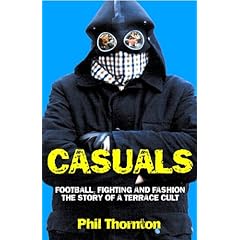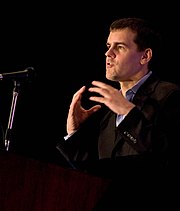
So, I received a new shipment of football books from Amazon.uk yesterday, prompting me to look at my bookshelves and think:
Christ, I have a lot of these.
Anyways, one thing led to another and I started thinking about who my all-time favourite writers were. Herewith, the results:
10th (tie)
Barry Glendenning, Sid Lowe, (and the Guardian in general). Anyone who doesn't get their football news from the
Guardian is missing something big; namely, the sharpest, funniest and bitchiest sports reporting on the planet. Their topnotch website has a team of good reporters, but the best of the bunch is Glendenning, who does at least one shot a week of the daily newsletter
the Fiver, as well as great minute-by-minute match-reports (always leavened with malicious but entirely deserved barbs at Scousers) and is a regular guest on James Richardson's weekly
podcast (also brilliant). Sid Lowe is actually a freelancer (he writes for
World Soccer,
Four Four Two and
The Telegraph as well), but his weekly roundup of Spanish football is not to be missed and the annual
"Sids" awards for the most ludicrous moments in Iberian footie are not to be missed. If Sid ever wrote a book, he'd probably be higher up this list.
9) (another tie)
David Winner, Alex Bellos and John Foot. Authors of three very good national football histories. Bellos is author of
Futebol: the Brazilian Way of Life - an excellent book on the cultural pervasiveness of the game in the land of
capoeira. Foot's book,
Calcio is an exhaustive if not terribly-exciting treatment on the history of Italian football. Winner is the author of
Brilliant Orange, possibly the single best national history of football ever written, and a fabulous look at the quirky world of Dutch football. Winner has also written
Those Feet, an equally quirky but not quite as good book about English football culture, and
Around the World 90 minutes (plus extra time and penalties), a truly execrable book about the 2006 World Cup which prevented him from climbing higher up this list.
8)
Hunter Davies. Yes, yes, he is also the ghost author of books "by" Wayne Rooney, Gazza and Dwight Yorke, all of which are crap. And yes, his cheeky-chappie routine in his weekly column in
The New Statesman can get tiresome. But he is also author of the classic
Glory Days, which arguably revolutionised the entire football publishing industry, and so deserves a spot in this list.
7)
David Conn. Not just author of the classic
The Football Business, but also a very good journalist as well. His recent
articles on the travails of Leeds United under Ken Bates should be required corrective reading for anyone who thinks that the problem of corruption is a peculiarly Italian phenomenon.
6)
Johnathan Wilson. He's been writing for years in places like
Four Four Two, covering obscure stories from the weirdest reaches of Eastern Europe, but last year graduated to the big time by publishing
Behind the Curtain, which is a general look at football across what used to be known as the Warsaw Pact. Not necessarily much better as a book than the Winner/Bellos/Foot trio, but the fact that he covers multiple cultures - and does it well - gives him the upper hand in my books. may now also be found on the excellent Guardian sports blog.
5)
Eduardo Galeano. I'm of mixed mind about Galeano. On the one hand, the whole Latin-American-magic-realism-anti-capitalist thing is pretty tiresome. On the other hand,
Soccer in Sun and Shadow is a rare combination of top-class football history and poetry. Plus, he's the one who turned me on to the Gramsci quote that adorns this blog.
4)
Nick Hornby. No one captures the relationship between fan and club the way Hornby does in
Fever Pitch (though the bastard went and TOTALLY RUINED it by adapting it to the FUCKING BOSTON REDSOX). And the fact that it's Arsenal he's talking about doesn't hurt either. Doesn't write much about football anymore, but his all-too-infrequent articles on the sport all still manage to hit brilliant notes. The most obvious one is the 2001 article where he described Gooners' initial fear that Thierry Henry (who, it is difficult to now remember, actually had a stuttering start at Highbury) might actually be "the French Perry Groves"; my personal favourite, about the mindset of the average England fan I quoted last year
back here.
3)
David Goldblatt. A new addition to the list, jumping straight in at number 3. His 2006 book,
The Ball is Round received lavish praise both as being the most exhaustive history of football ever (which is true) and as being the most erudite book on football ever (which is not). All he's really done is read a lot of secondary material on football, much of it referenced in this column, and enriched it with some (admittedly pretty competent) economic and social history. Covering the last 150 years of global history in this matter is no mean feat, but while it makes for a damn good book it never quite manages to treads any new ground.
2)
Richard Giulianotti. The real king of football erudition. This professor from Durham University is not for everyone, but if you like a scholarly bent on things, he's your man. In addition to authoring the unbelievably well-researched
Football: A Sociology of the Global Game, he has also edited or co-edited a number of excellent books, including
Fear and Loathing in World Football, and
Entering the Field: New Perspectives on World Football. More than anyone else, he has put the study of football on a solid theoretical footing.
1)
Simon Kuper (pictured, above). He is as God. Sure,
Ajax, the Dutch, the War was a bit disappointing, but
Football Against the Enemy - a book he wrote at the age of 23 while travelling to 20-odd countries on a shoestring budget - still gets most people's votes as the best football book ever and one of the best books ever written about any sport. And his Saturday columns in the
Financial Times occasionally touch similar heights: his account of overheard conversation between
Wenger, Lippi and Houllier at the Champions League final in Athens last May was simply fascinating
. Never miss anything he has to say: it never fails to be top-notch.
Final Honourable Mention: Pretty much the entire crew at
When Saturday Comes. Can't single out any writers by name because they're a largely faceless bunch, which is appropriate at a magazine that favours substance over style. But the product they put out is consistently good, and although the editorial tone is a little overbearing in its "campaign-for-real-football" style, it only occasionally comes over as Little-Englander . Its international coverage is spotty but what it has is the best in the business. Most of all, it has the bite and humour that is so sorely lacking in most sports journalism - a testament to its fanzine origins. May they never change.
 Different cultures have different "affectionate" names for referees. In Italy, the term "testa di merda" is the usual term of abuse for the men in black. In Spain, "cabron" is the phrase of choice , and while among American Latinos this term is usually thought untranslatable because of the way it manages to mix the concepts of "dude" and "asshole", among Castillians it's the latter, pure and simple. The English, however, for reasons that are not entirely clear, prefer the term "wanker".
Different cultures have different "affectionate" names for referees. In Italy, the term "testa di merda" is the usual term of abuse for the men in black. In Spain, "cabron" is the phrase of choice , and while among American Latinos this term is usually thought untranslatable because of the way it manages to mix the concepts of "dude" and "asshole", among Castillians it's the latter, pure and simple. The English, however, for reasons that are not entirely clear, prefer the term "wanker".




















